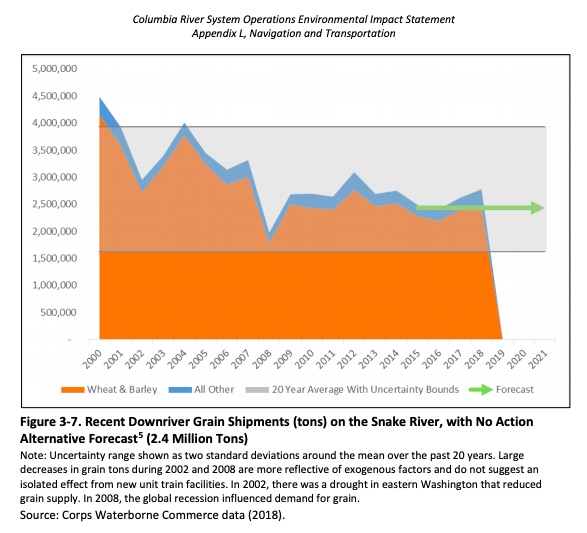forum
library
tutorial
contact

Reason to Oppose Dam Breaching
on the Snake River
by Kurt Miller
Bend Bulletin, January 11, 2022
|
the film forum library tutorial contact |

|
Reason to Oppose Dam Breaching
by Kurt Miller
|
 Recently, I keynoted the Business & the Environment conference - an annual event hosted by the Northwest Environmental Business Council. After 30 years in the Northwest energy field, it was a privilege to share what I've learned.
Recently, I keynoted the Business & the Environment conference - an annual event hosted by the Northwest Environmental Business Council. After 30 years in the Northwest energy field, it was a privilege to share what I've learned.
My message was that good environmental energy policy doesn't happen by accident; a policy that sounds good in isolation may not be sound when examined holistically.
A good example of this truism comes in the form of proposals to remove productive hydroelectric dams. When looked at holistically, these proposals have significant shortcomings.
The good news is Northwest residents comprehend the issue.
This past summer, respected pollster DHM Research conducted a survey sponsored by Northwest RiverPartners to examine the issue further. The results showed only 29% of the region supports the idea of breaching the lower Snake River dams as a means to help salmon. These findings are consistent with a poll released by Washington Conservation Voters earlier this year.
It's clear a strong majority of Northwest residents do not see dam breaching as a productive environmental energy policy. Given the vast coverage dam breaching efforts have received this year, this result is pretty remarkable.
While residents weren't asked to share their reasons, I believe three core considerations make the case for preserving these important hydropower resources.
Firstly, breaching the lower Snake River dams is guaranteed to fail as a solution to restore the Northwest's salmon populations. That may seem to be a bold claim, but the fact is just four of the Columbia River Basin's 13 listed stocks of threatened/endangered salmon pass those dams. That number doesn't count the dwindling salmon populations of the Puget Sound, Canada's free-flowing Fraser River, or even the struggling salmon populations in Alaska's Yukon River.
In short, there is a coastwide salmon crisis, which dam breaching is ill-equipped to address, but the costs associated with mitigating the loss of the lower Snake dams are astronomical; estimated to be $33.5 billion by US Representative Mike Simpson (R - ID).
Secondly, the region is already at an elevated risk of blackouts according to multiple government agencies and energy forecasters. This risk stems from retirement of fossil-fuel plants in an effort to combat climate change. These plants produce roughly 35% of our region's electricity. That figure is massive, especially because those resources can provide nonstop energy in contrast with their climate-friendly replacements-wind and solar power.
Meanwhile, we have energy policies encouraging the electrification of virtually every aspect of our lives. In other words, we have more electricity demand coming at the same time that we're losing a third of our power supply.
As a result, we quite literally can't afford to lose the reliable, clean energy provided by the lower Snake dams if we want a dependable, carbon-free electric grid. An October report released by Pacific Northwest National Laboratory emphasizes this point by highlighting the critical "black start" capabilities hydropower generation provides. These capabilities are essential for the grid to restore power under potential disaster scenarios.
Thirdly, this August, the UN issued a "Code Red for Humanity" because we, as a planet, continually miss our decarbonization targets. Following the COP26 summit, it's clear that we are still on a dangerous trajectory. Not only that, but the UN released a 2019 report indicating ocean warming and acidification represent an existential threat to marine fish. Salmon, a coldwater species, are especially at risk.
In a carbon-constrained world, breaching the lower Snake River dams is not a holistically sound energy policy for people, salmon, and the environment. Most northwesterners seem to get that, thankfully, but we must all speak up for these cohesive energy policies if we want our leaders to deliver them.
learn more on topics covered in the film
see the video
read the script
learn the songs
discussion forum
